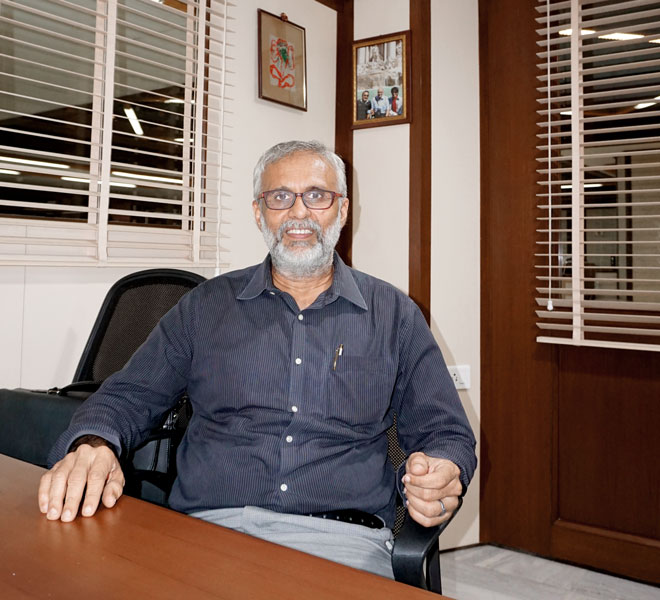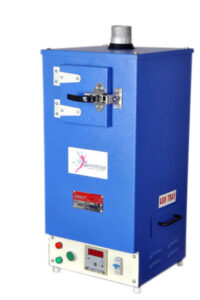It is heartening to know that the Tamil Nadu Government has played an exemplary role in getting incinerators installed in government schools, colleges and girls hostels, to ensure hygienic disposal of soiled sanitary napkins.

J Govindaraj, a Rotarian from RC Madras East, who is the Director (HR and Finance) of Glo Life Care Equipment Pvt Ltd, the market leader in India for making sanitary napkin vending machines and incinerators, says that in the last two years alone his company has put in 14,000 incinerators in government institutions in the southern State.
This trend started by distributing free sanitary napkins in Government institutions in Tamil Nadu, and was followed by fitting incinerators for their disposal.
This includes all the 70 Chennai Corporation schools, 780 Adi Dravida girls hostels, 552 BC and MBC hostels, and 32 juvenile homes for girls. “The TN Government is in the forefront in this area and it helps that we have a woman Chief Minister in the State,” he says.
This trend started with the distribution of free sanitary napkins in Government institutions, which had to be followed by the fitting of incinerators for their disposal. Not only have other Municipalities in Tamil Nadu followed suit, some other States such as Andhra Pradesh and Karnataka are following this example, he says.
Some universities in Maharashtra have directed all women’s colleges to fit vending machines for sanitary napkins.
Govindaraj says that his company, which has an 80 per cent market share in sanitary napkin vending machines and incinerators, sees exciting possibilities on working both with Rotary’s Wash in Schools projects as well as the huge number of toilets being built by major corporates under the Swachh Bharat Abhiyan. “Rotary’s goals and our products are aligned and we are getting business also from the CSR projects being done by corporates.” For instance both TCS and Airtel have announced an outlay of Rs 100 crore each for toilet building under the Prime Minister’s Swachh Bharat scheme and oil marketing companies have announced the construction of 12,000 toilets on highways.
As women in many technology companies cannot carry handbags or clutch purses inside the office, sanitary napkins have to be provided to them.
A chunk of this work has gone to Sulabh, which buys its incinerators from Glo Life Care.
Depending on the size and disposal capacity, the cost of incinerators ranges between Rs 20,000 and Rs 90,000.
The Genesis
It is interesting to learn from Govindaraj about how Tamil Nadu became the forerunner in this area. “Till four years ago, nothing much was happening in this industry in India. Then the credit card fraud happened and data was being stolen from BPOs, cards were cloned and used abroad.”
Only after this the two-way verification, including onetime mobile passwords, happened. And suddenly customers who were transferring their processes to India, particularly banks, started auditing the environment in which BPOs worked, before transferring their business data to India. At first they said no hard disks, USB devices, personal instruments or mobile phones would be allowed inside the working chambers. Then they said women’s handbags or clutch purses would not be allowed inside the office. So women couldn’t carry anything, including sanitary napkins. “This enforcement of a very secure business environment actually turned the business for us. I recently visited a foreign bank’s BPO in Chennai and found that there are lockers outside; so if an employee receives a courier, it has to be left there, and can’t be taken inside … companies have become that careful about data theft.”
Some universities in Maharashtra have directed all women’s colleges to fit vending machines for sanitary napkins.
The next logical step was to put in vending machines. His company, with annual sales of around Rs 7 crore, manufactures both on a 50:50 basis. Fitting vending machines is easier than installing incinerators as no pipes are necessary. But IT companies which are sensitive about capital expenditure, pass this on contract to their facility management teams, who load and stock the machines, even though the companies pay for the napkins. Next comes the incinerators, which burn the used napkins.
On how an incinerator works, he says it has twin chambers; the dropping chamber to collect the soiled napkins from where they go to the burning chamber, where it takes upto 350–400 degrees to burn them. There are timers in different models, and schools and colleges go in for incinerators as disposal of sanitary napkins clogs their drains.
When asked for solution for indiscriminate disposal of napkins from many homes, particularly slums, on roads, Govindaraj says his team is presently engaged in research on making much smaller models which can burn one napkin at a time. “When this model is ready, incinerators can be installed in homes.”
Hospitals of course have giant incinerators as do women intensive factories, he adds.






